1990 年 1 月英语四级真题及答案
Part I Listening Comprehension (20 minutes)
Section A
Directions: Inthissection,youwillhear10shortconversations.Attheendofeach
conversation, a question will be asked about what was said. Both the
conversationandthequestionwillbespokenonlyonce.Aftereachquestion
therewillbepause.Duringthepause,youmustreadthefourchoicesmarked
A), B), C) and D), and decide which is the best answer. Then mark the
corresponding letter on the Answer Sheet with a line through the centre.
Example:
You will hear:
You will read:
A) At the office.
B) In the waiting room.
C) At the airport.
D) In a restaurant.
From the conversation we know that the two were talking about some work they had
to finish in the evening. This is most likely to have taken place at the office. There
fore, A) “At the office” is the best answer. You should choose [A] on the Answer Sheet
and mark it with a single line through the centre.
Sample Answer [A] [B] [C] [D]
1.
A) The man wants to go to Los Angeles.
B) The man wants to go to San Francisco.
C) There are no flights to Los Angeles for the rest of the day.
D) There are two direct flights to Los Angeles within the next two hours.
2.
A) He enjoys writing home every week.
B) He never fails to write a weekly letter home.
C) He doesn’t write home once a week now.
D) He has been asked to write home every week.
3.
A) Because she has got an appointment.
B) Because she doesn’t want to.
C) Because she has to work.
D) Because she wants to eat in a new restaurant.
�
4.
A) The teacher postponed the meeting.
B) There won’t be a test this afternoon.
C) The students will be attending the meeting.
D) The students will take an English test this afternoon.
5.
A) On the whole, she liked the film.
B) She didn’t see the film.
C) The film was very exciting.
D) The film wasn’t as good as she’d expected.
6.
A) Around 5:00.
B) Around 3:00.
C) At 2:00.
D) At 1:00.
7.
A) He had to work overtime.
B) He was held up in traffic.
C) His car ran out of gas.
D) He had a traffic accident.
8.
A) John Smith isn’t in right now.
B) John Smith can’t come to the phone right now.
C) John Smith doesn’t want to speak to the caller.
D) The caller dialed the wrong number.
9.
A) Yesterday.
B) Three days ago.
C) Two days ago.
D) Early last week.
10. A) She got up later than usual.
B) The bus was late.
C) She forgot she had classes.
D) Her clock was slow.
Section B
Directions: Inthissection,youwillhear3shortpassages.Attheendofeachpassage,
you will hear some questions. Both the passage and the questions will be
spokenonlyonce.Afteryouhearaquestion,youmustchoosethebestanswer
�
fromthefourchoicesmarkedA),B),C)andD).Thenmarkthecorresponding
letter on the Answer Sheet with a single line through the centre.
Questions 11 to 13 are based on the passage you have just heard.
Passage One
11. A) 4,000 years ago.
B) 3,000 years ago.
C) 2,000 years ago.
D) 1,000 years ago.
12. A) The small bowl was put above the large bowl.
B) The large bowl was put above the small bowl.
C) The small bowl was put inside the large bowl.
D) The large bowl consisted of two equal parts.
13. A) Horsemen.
B) Brass doors.
C) Drops of water.
D) Metal balls.
Questions 14 to 16 are based on the passage you have just heard.
Passage Two
14. A) They are the most attractive women in Britain.
B) They are the most popular film stars.
C) They are the first women news announcers on British television.
D) They appear almost every night in TV plays.
15. A) At 10 in the evening.
B) At 9 in the evening.
C) At 9 in the morning.
D) At 10 in the morning.
16. A) People still talk a lot about it.
B) Fewer people watched Susan’s programme from then on.
C) Anna’s photographs appeared frequently in newspapers.
D) The number of viewers of her programme that day increased by millions.
�
Questions 17 to 20 are based on the passage you have just heard.
Passage Three
17. A) It is completely flat.
B) It has few rivers.
C) It has many large lakes.
D) It is hilly.
18. A) The soil has been overworked.
B) The climate is cold.
C) The weather is too dry.
D) The soil is sandy.
19. A) By raising cattle.
B) By working on farms.
C) By working in factories.
D) By raising sheep.
20. A) At school.
B) From their parents.
C) From books.
D) In factories.
Part II Reading Comprehension (35 minutes)
Directions: Thereare4readingpassagesinthispart.Eachpassageisfollowedbysome
questionsorunfinishedstatements.Foreachofthemtherearefourchoices
markedA),B),C)andD).Youshoulddecideonthebestchoiceandmarkthe
corresponding letter on the Answer Sheet with a single line through the
centre.
Passage One
Questions 21 to 25 are based on the following passage.
Oceanography has been defined as “The application of all sciences to the study
of the sea”.
Before the nineteen century, scientists with an interest in the sea were few and
far between. Certainly Newton considered some theoretical aspects of it in his writings,
but he was reluctant to go to sea to further his work.
For most people the sea was remote, and with the exception of early intercontinental
travelers or others who earned a living from the sea, there was little reason to ask
�
many questions about it, let alone to ask what lay beneath the surface. The first time
that question “What is at the bottom of the oceans?” had to be answered with any
commercial consequence was when the laying of a telegraph cable from Europe to America
was proposed. The engineers had to know the depth profile (起伏形状) of the route to
estimate the length of cable that had to be manufactured.
It was to Maury of the US Navy that the Atlantic Telegraph Company turned, in 1853,
for information on this matter. In the 1840s, Maury had been responsible for encouraging
voyages during which soundings(测声) were taken to investigate the depths of the North
Atlantic and Pacific Oceans. Later, some of his findings aroused much popular interest
in his book The Physical Geography of the Sea.
The cable was laid, but not until 1866 was the connection made permanent and reliable.
At the early attempts, the cable failed and when it was taken out for repairs it was
found to be covered in living growths, a fact which defied contemporary scientific
opinion that there was no life in the deeper parts of the sea.
Within a few years oceanography was under way. In 1872 Thomson led a scientific
expedition (考察), which lasted for four years and brought home thousands of samples
from the sea. Their classification and analysis occupied scientists for years and led
to a five-volume report, the last volume being published in 1895.
21. The proposal to lay a telegraph cable from Europe to America made oceanographic
studies take on ________.
A) an academic aspect
B) a military aspect
C) a business aspect
D) an international aspect
22. It was ________ that asked Maury for help in oceanographic studies.
A) the American Navy
B) some early intercontinental travelers
C) those who earned a living from the sea
D) the company which proposed to lay an undersea cable
23. The aim of the voyages Maury was responsible for in the 1840s was ________.
A) to make some sounding experiments in the oceans
B) to collect samples of sea plants and animals
C) to estimate the length of cable that was needed
D) to measure the depths of the two oceans
24. “Defied” in the 5th paragraph probably means “________”.
A) doubted
�
B) gave proof to
C) challenged
D) agreed to
25. This passage is mainly about ________.
A) the beginnings of oceanography
B) the laying of the first undersea cable
C) the investigation of ocean depths
D) the early intercontinental communications
Passage Two
Questions 26 to 30 are based on the following passage.
Normally a student must attend a certain number of courses in order to graduate,
and each course which he attends gives him a credit which he may count towards a degree.
In many American universities the total work for a degree consists of thirty-six courses
each lasting for one semester. A typical course consists of three classes per week for
fifteen weeks; while attending a university a student will probably attend four or five
courses during each semester. Normally a student would expect to take four years
attending two semesters each year. It is possible to spread the period of work for the
degree over a longer period. It is also possible for a student to move between one
university and another during his degree course, though this is not in fact done as
a regular practice.
For every course that he follows a student is given a grade, which is recorded,
and the record is available for the student to show to prospective employers. All this
imposes a constant pressure and strain of work, but in spite of this some students still
find time for great activity in student affairs. Elections to positions in student
organizations arouse much enthusiasm. The effective word of maintaining discipline is
usually performed by students who advise the academic authorities. Any student who is
thought to have broken the rules, for example, by cheating has to appear before a student
court. With the enormous numbers of students, the operation of the system does involve
a certain amount of activity. A student who has held one of these positions of authority
is much respected and it will be of benefit to him later in his career.
26. Normally a student would at least attend ________ classes each week.
A) 36
B) 20
C) 12
D) 15
27. According to the first paragraph an American student is allowed ________.
�
A) to live in a different university
B) to take a particular course in a different university
C) to live at home and drive to classes
D) to get two degrees from two different universities
28. American university students are usually under pressure of work because ________.
A) their academic performance will affect their future careers
B) they are heavily involved in student affairs
C) they have to observe university discipline
D) they want to run for positions of authority
29. Some students are enthusiastic for positions in student organizations probably
because ________.
A) they hate the constant pressure strain of their study
B) they will then be able to stay longer in the university
C) such positions help them get better jobs
D) such positions are usually well paid
30. The student organizations seem, to be effective in ________.
A) dealing with the academic affairs of the university
B) ensuring that the students observe university regulations
C) evaluating students’ performance by bringing them before a court
D) keeping up the students’ enthusiasm for social activities
Passage Three
Questions 31 to 35 are based on the following passage.
Do you find getting up in the morning so difficult that it’s painful? This might
be called laziness, but Dr. Kleitman has a new explanation. He has proved that everyone
has a daily energy cycle.
During the hours when you labor through your work you may say that you’re “hot”.
That’s true. The time of day when you feel most energetic is when your cycle of body
temperature is at its peak. For some people the peak comes during the afternoon. For
others it comes in the afternoon or evening. No one has discovered why this is so, but
it leads to such familiar monologues (自言自语) as: “Get up, John! You’ll be late
for work again!” The possible explanation to the trouble is that John is at his
temperature-and-energy peak in the evening. Much family quarrelling ends when husbands
and wives realize what these energy cycles mean, and which cycle each member of the
family has. You can’t change your energy cycle, but you can learn to make your life
fit it better. Habit can help, Dr. Kleitman believes. Maybe you’re sleepy in the evening
�
but feel you must stay up late anyway. Counteract (对抗) your cycle to some extent by
habitually staying up later than you want to. If our energy is low in the morning but
you have an important job to do early in the day, rise before your usual hour. This
won’t change your cycle, but you’ll getupsteam (鼓起干劲) and work better at your
low point.
Get off to a slow start which saves your energy. Get up with a leisurely yawn and
stretch. Sit on the edge of the bed a minute before putting your feet on the floor.
Avoid the troublesome search for clean clothes by laying them out the night before.
Whenever possible, do routine work in the afternoon and save tasks requiring more energy
or concentration for your sharper hours.
31. If a person finds getting up early a problem, most probably ________.
A) he is a lazy person
B) he refuses to follow his own energy cycle
C) he is not sure when his energy is low
D) he is at his peak in the afternoon or evening
32. Which of the following may lead to family quarrels according to the passage?
A) Unawareness of energy cycles.
B) Familiar monologues.
C) A change in a family member’s energy cycle.
D) Attempts to control the energy cycle of other family members.
33. If one wants to work more efficiently at his low point in the morning, he should
________.
A) change his energy cycle
B) overcome his laziness
C) get up earlier than usual
D) go to bed earlier
34. You are advised to rise with a yawn and stretch because it will ________.
A) help to keep your energy for the day’s work
B) help you to control your temper early in the day
C) enable you to concentrate on your routine work
D) keep your energy cycle under control all day
35. Which of the following statements is NOT TRUE?
A) Getting off to work wit a minimum effort helps save one’s energy.
B) Dr. Kleitman explains why people reach their peaks at different hours of day.
�
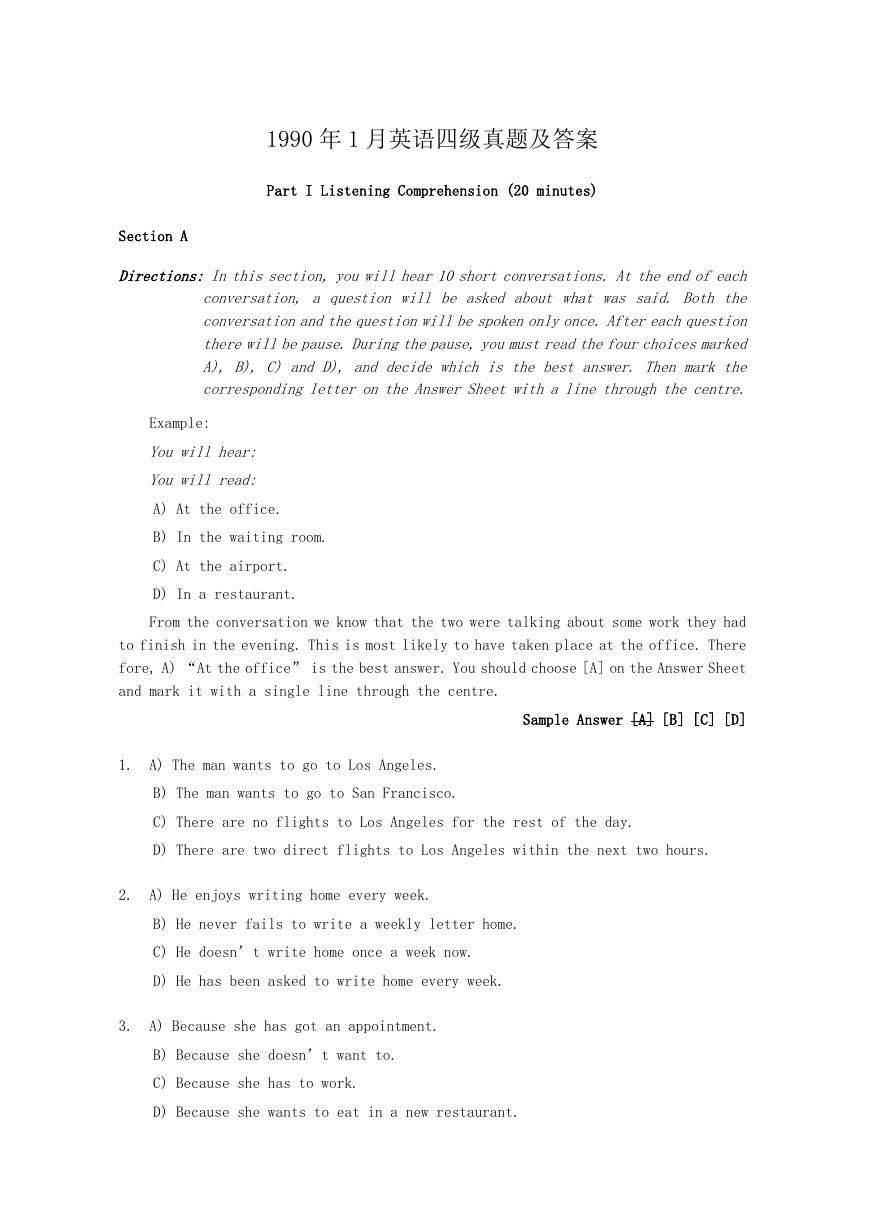
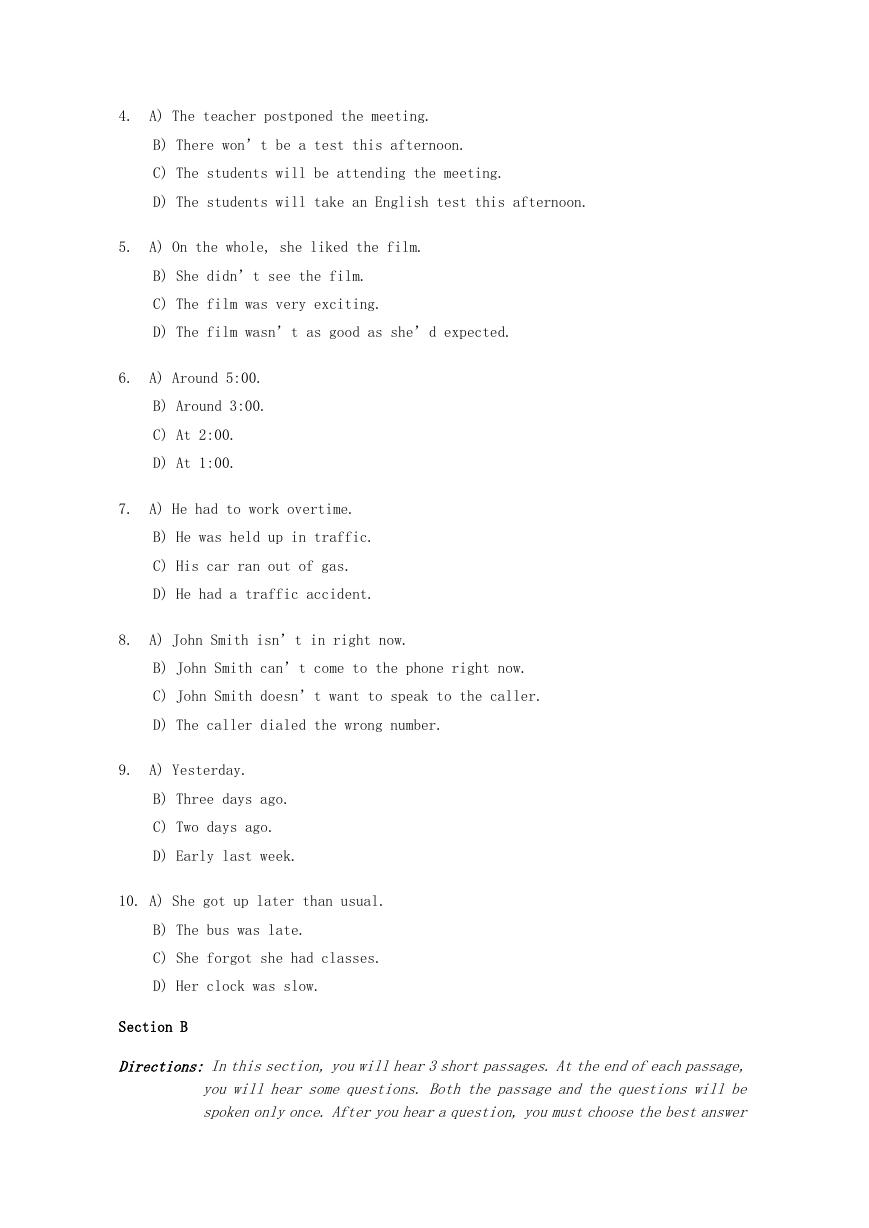
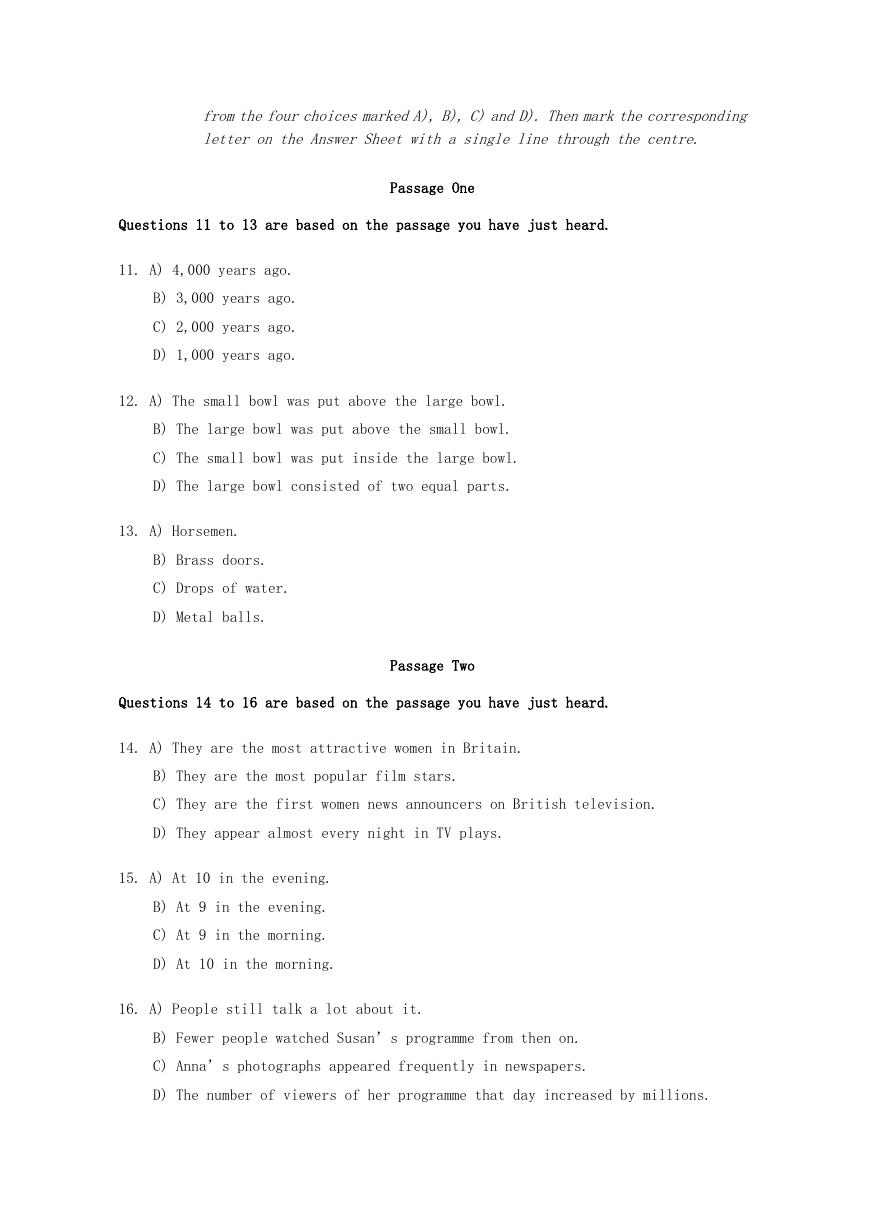
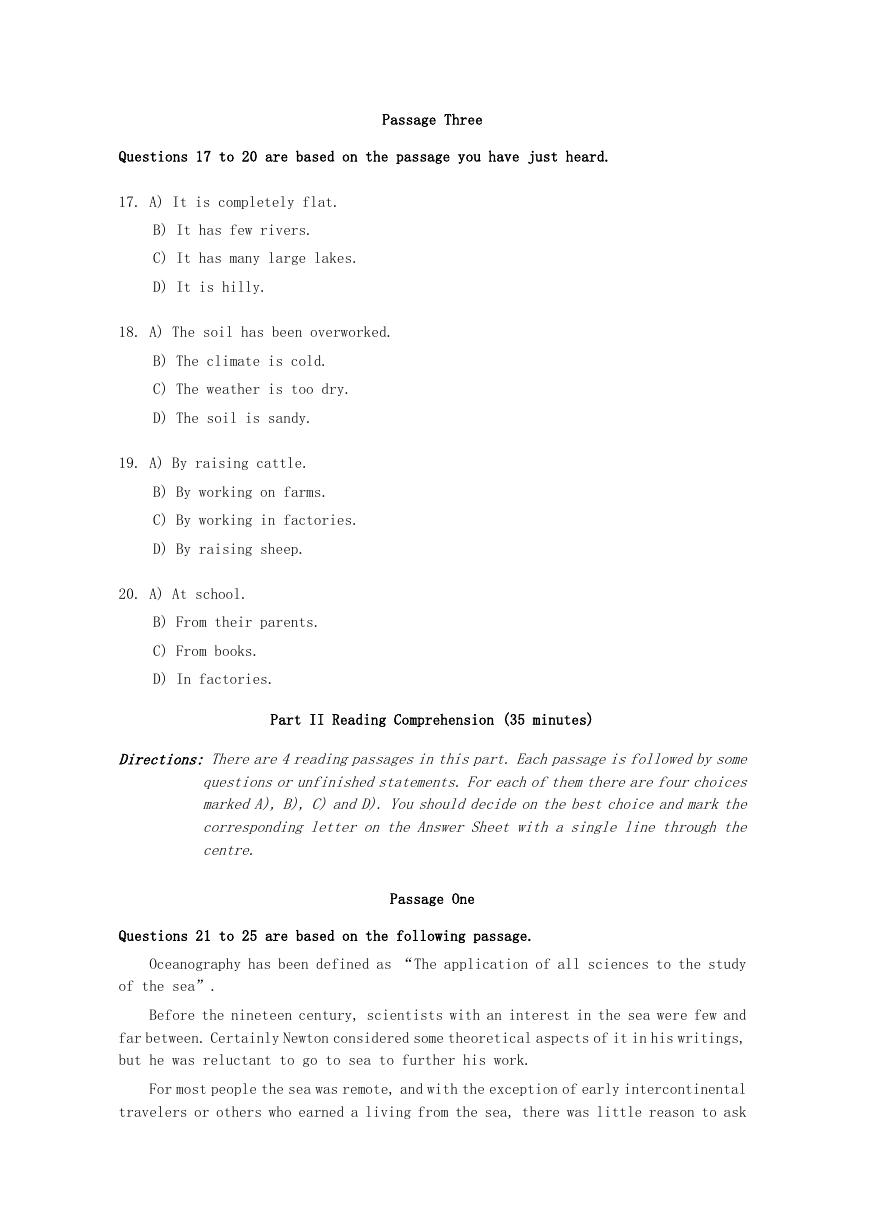

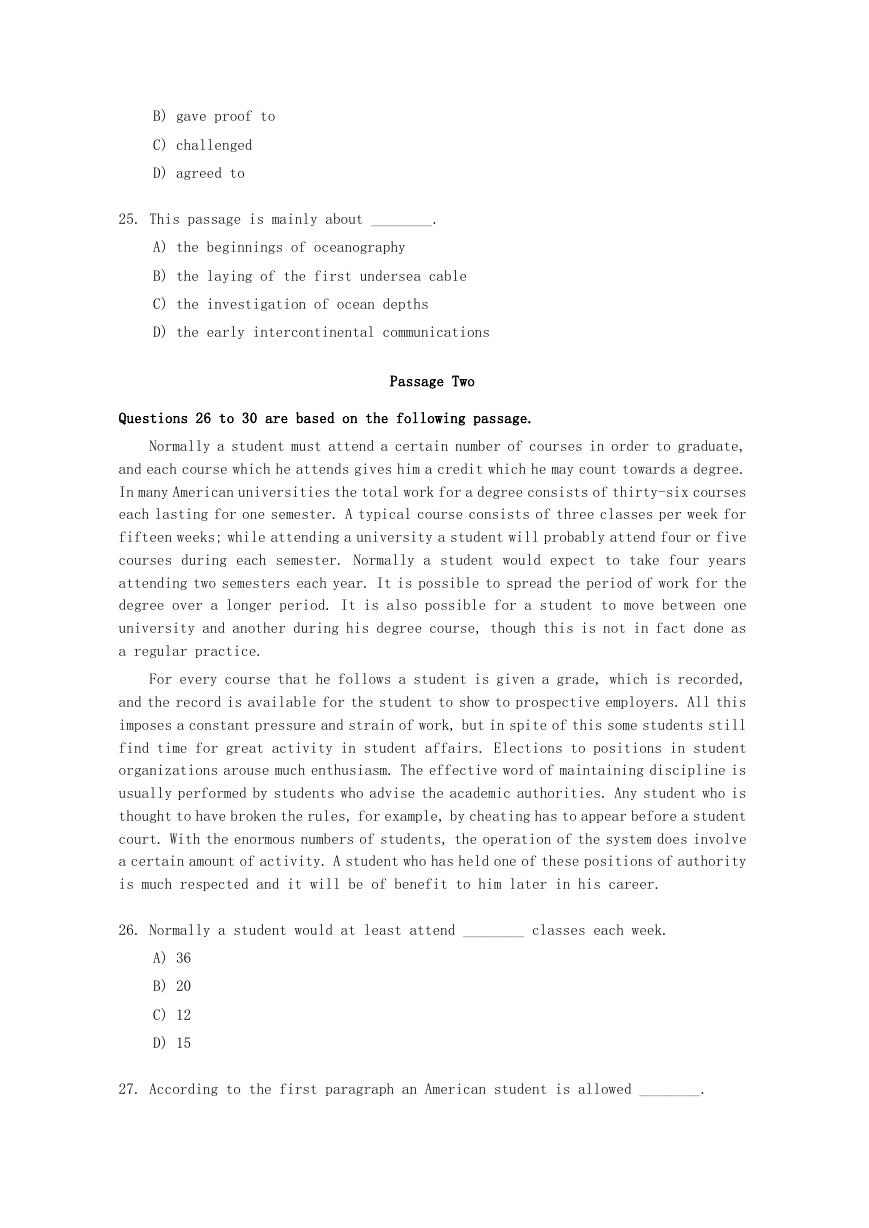
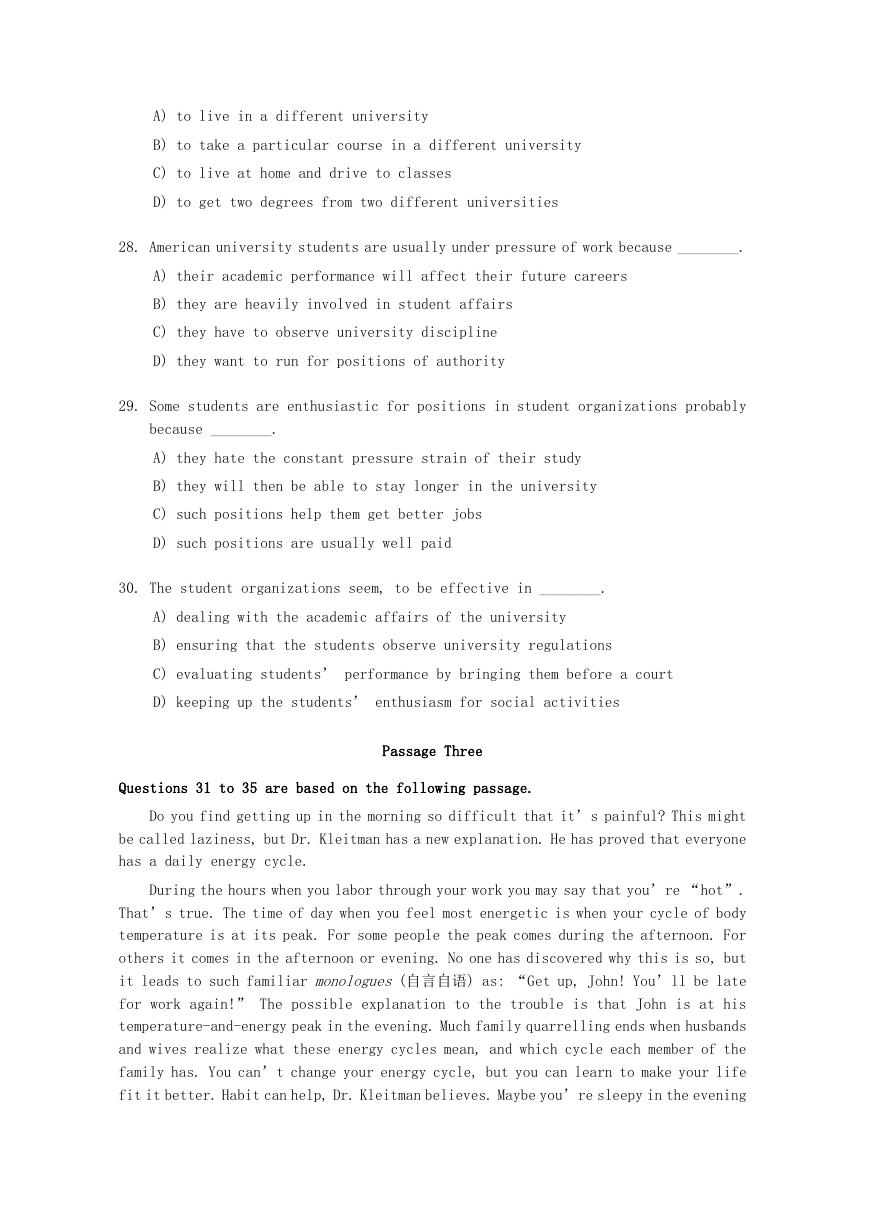
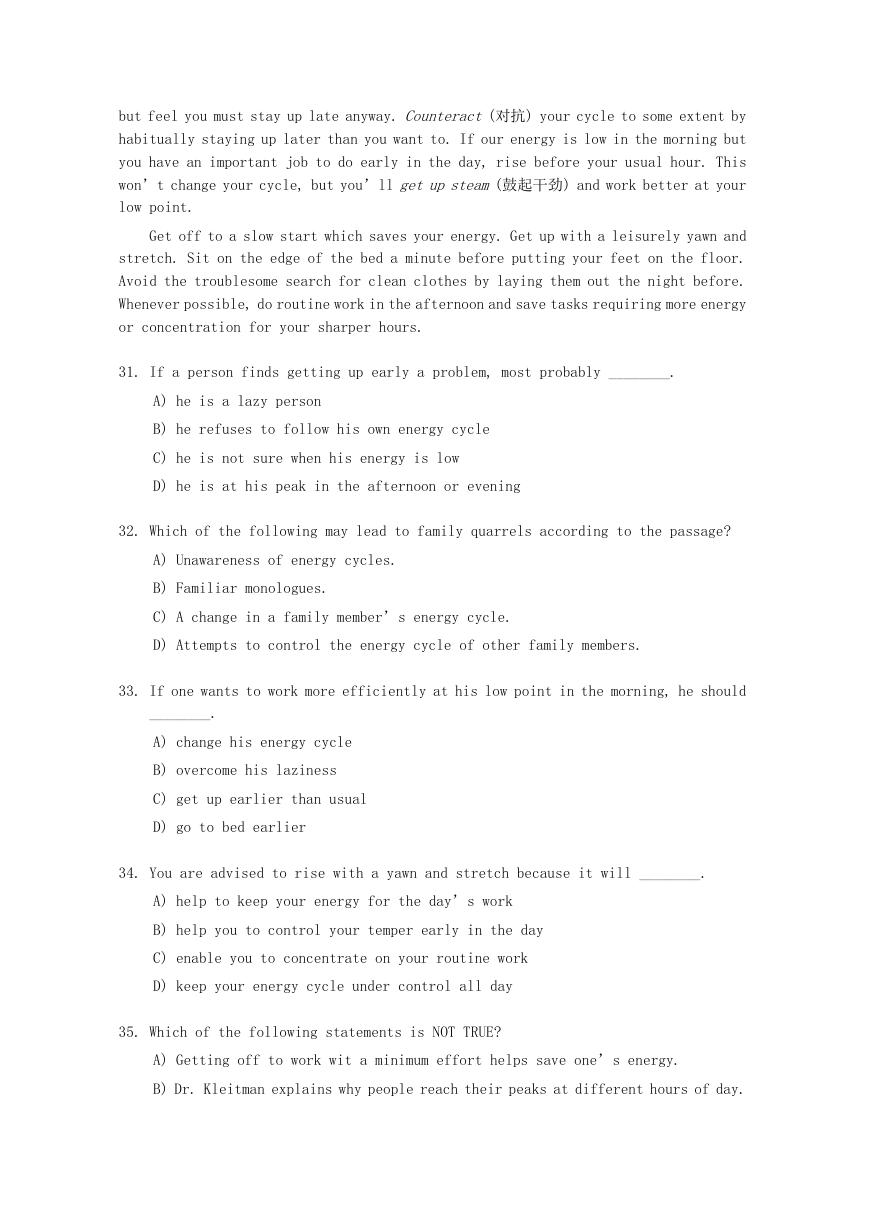








 2023年江西萍乡中考道德与法治真题及答案.doc
2023年江西萍乡中考道德与法治真题及答案.doc 2012年重庆南川中考生物真题及答案.doc
2012年重庆南川中考生物真题及答案.doc 2013年江西师范大学地理学综合及文艺理论基础考研真题.doc
2013年江西师范大学地理学综合及文艺理论基础考研真题.doc 2020年四川甘孜小升初语文真题及答案I卷.doc
2020年四川甘孜小升初语文真题及答案I卷.doc 2020年注册岩土工程师专业基础考试真题及答案.doc
2020年注册岩土工程师专业基础考试真题及答案.doc 2023-2024学年福建省厦门市九年级上学期数学月考试题及答案.doc
2023-2024学年福建省厦门市九年级上学期数学月考试题及答案.doc 2021-2022学年辽宁省沈阳市大东区九年级上学期语文期末试题及答案.doc
2021-2022学年辽宁省沈阳市大东区九年级上学期语文期末试题及答案.doc 2022-2023学年北京东城区初三第一学期物理期末试卷及答案.doc
2022-2023学年北京东城区初三第一学期物理期末试卷及答案.doc 2018上半年江西教师资格初中地理学科知识与教学能力真题及答案.doc
2018上半年江西教师资格初中地理学科知识与教学能力真题及答案.doc 2012年河北国家公务员申论考试真题及答案-省级.doc
2012年河北国家公务员申论考试真题及答案-省级.doc 2020-2021学年江苏省扬州市江都区邵樊片九年级上学期数学第一次质量检测试题及答案.doc
2020-2021学年江苏省扬州市江都区邵樊片九年级上学期数学第一次质量检测试题及答案.doc 2022下半年黑龙江教师资格证中学综合素质真题及答案.doc
2022下半年黑龙江教师资格证中学综合素质真题及答案.doc